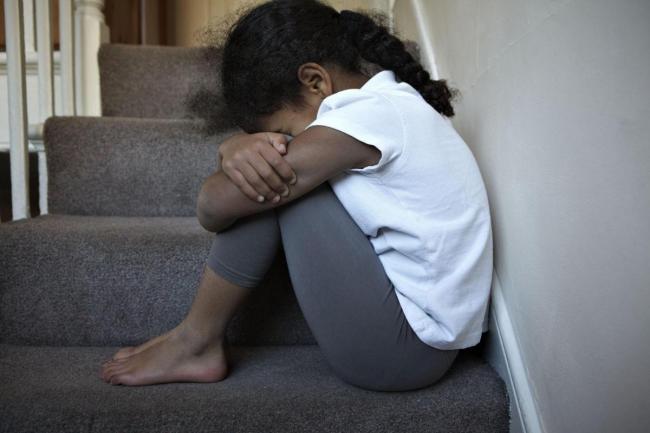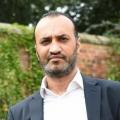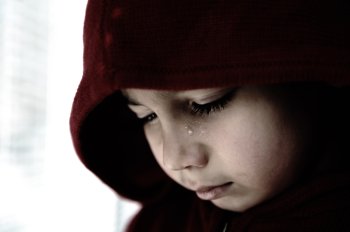THEY ARE ALL PATRIARCHIAL
Child sex abuse takes place in almost all major UK religions, inquiry finds
2 September 2021

An inquiry into child sexual abuse says it has found "shocking failings" of religious organisations to protect children.
The Independent Inquiry said child sexual abuse had been found in most major UK religions and described the 'blatant hypocrisy' of those claiming to teach right from wrong.
Victim-blaming, an absence of discussion around sex and sexuality, abuse of power by religious leaders and discouraging external reporting are among the "shocking failures" outlined in the report from the Independent Inquiry into Child Sexual Abuse (IICSA).
The Child Protection In Religious Organisations And Settings report examined evidence from 38 religious organisations with a presence in England and Wales.
The report, based on 16 days of public hearings held during March, May and August 2020, said there was likely to be a significant under-reporting of child sexual abuse in religious organisations and settings.
These included Jehovah's Witnesses, Baptists, Methodists, Islam, Judaism, Sikhism, Hinduism, Buddhism, and non-conformist Christian denominations.
The IICSA had already held separate investigations into the Roman Catholic Church and the Anglican Church, the two largest religious groups in the country.
Read more:
It found that what marks religious organisations out from other institutions is "the explicit purpose they have in teaching right from wrong; the moral turpitude of any failing by them in the prevention of, or response to, child sexual abuse is therefore heightened".
However, there was "significant diversity" between religious organisations as to whether they had adequate child protection policies in place and the extent to which they effectively follow them.
"Religious believers can find it difficult to accept that members of their congregation or religious leaders could perpetrate abuse," the report said.
"As a result, some consider that it is not necessary to have specific child protection procedures or to adhere strictly to them."
An example was given of four people who were sexually abused when they were approximately nine years old whilst they were being taught the Koran by a teacher in a mosque.
Read more:
In 2017, the perpetrator was convicted and sentenced to 13 years' imprisonment, the report said.
Another example given was of a girl who was sexually assaulted by a church volunteer when she was 12 years old. She disclosed the abuse to her mother, who reported it to the police.
After being made aware of the allegations, a church minister told her mother that the abuser was "valued" and must be considered "innocent until proven guilty".
The report said it later became known that the abuser had previously been dismissed from a police force following charges of unlawful sexual intercourse with a minor.
Professor Alexis Jay, chairwoman of the Inquiry, said: "Religious organisations are defined by their moral purpose of teaching right from wrong and protection of the innocent and the vulnerable.
"However when we heard about shocking failures to prevent and respond to child sexual abuse across almost all major religions, it became clear many are operating in direct conflict with this mission.
"Blaming the victims, fears of reputational damage and discouraging external reporting are some of the barriers victims and survivors face, as well as clear indicators of religious organisations prioritising their own reputations above all else.
"For many, these barriers have been too difficult to overcome.
"We have seen some examples of good practice, and it is our hope that with the recommendations from this report, all religious organisations across England and Wales will improve what they do to fulfil their moral responsibility to protect children from sexual abuse."
Read more:
Richard Scorer, a specialist abuse lawyer who acts for seven victim and survivor groups in the inquiry, said children had been "catastrophically failed" by some religious groups with non-existent safeguarding policies.
He added: "This is simply unacceptable. It is clear from the report that too many religious organisations continue to prioritise the protection, reputation and authority of religious leaders above the rights of children."
There are an estimated 250,000 children in England and Wales who receive "supplementary schooling" or "out-of-school provision" from a faith organisation, the report revealed.
That said, there is no reliable information on how many settings there are, and as there is no requirement for such schools to be registered with any state body, they have no supervision or oversight in respect of child protection.
The report provided two recommendations moving forward: that all religious organisations have a child protection policy and that the government should legislate to amend the definition of full-time education to bring any setting that is the pupil's primary place of education within the scope of a registered school.
Read more:
In response to the inquiry, the Methodist Church said it "welcomes" the findings.
"While it will take time for us to study today’s report, early indications are that it includes many areas where religious organisations are still failing their members and we are truly sorry for where this happens in our churches," a statement from the secretary of the Conference of the Methodist Church, Rev Dr Jonathan Hustler, read.
It went on to say: "There can be never be any excuse for failings in safeguarding and it is the responsibility of everyone connected with the Methodist Church to uphold the highest standards in order to protect children and vulnerable people."
Meanwhile, the Muslim Council of Britain (MCB) said the abuse inquiry report "makes for difficult reading and underlines the importance of education centred around the wellbeing of children".
It added: "The protection of children is rooted in our religious traditions and should be at the centre of all Muslim institutions. This includes child safeguarding policies and regular on-going training.
"Crucially, children must feel confident in reporting any concerns they have.
"The MCB is committed to providing resources and support for our affiliated organisations, and to sharing good practice already out there, to foster safe and nurturing environments for children in religious settings."
Children's charity NSPCC said the report highlighted "a host of fundamental, reoccurring safeguarding flaws" that left children vulnerable.
A spokesman said: "As a result, many young people have suffered terrible abuse and then found there is no-one willing to listen to them and provide help and support.
"A significant barrier to tackling child sexual abuse within religious settings has been a failure of members to prioritise safeguarding and make it a serious issue that requires substantive attention and action."
The charity recognised that, although the safeguarding of children and young people in their community should always be prioritised, "it is important to recognise the shortage of support and advice for religious organisations seeking to improve their safeguarding policies and procedures".

NEW REPORT
UK religions display 'Blatant hypocrisy and moral failing' due to lack of lack of child safeguarding policies
Child sexual abuse has been found in most major UK religionous organisations, according to a new report by the Independent Inquiry into Child Sexual Abuse.
The Child Protection in Religious Organisations and Settings investigation examined child protection policies and safeguarding cultures in religious organisations in England and Wales. These included Jehovah’s Witnesses, Baptists, Methodists, Islam, Judaism, Sikhism, Hinduism, Buddhism and non-conformist Christian denominations.
Religious organisations play a central and even dominant role in the lives of millions of children in England and Wales. The report highlights the 'blatant hypocrisy and moral failing of religions' purporting to teach right from wrong and yet failing to prevent or respond to child sexual abuse.
The report found many religious organisations and settings do not consistently undertake DBS checks of those who may have contact with children, an essential prerequisite for adequate child protection.
Throughout the investigation, the Inquiry heard of 'shocking failings' across a number of religious organisations, and cases of child sexual abuse perpetrated by their followers.
One victim was sexually assaulted by a church volunteer when she was 12 years old. Another disclosed the abuse to her mother, who reported it to the police. After being made aware of the allegations, a church minister told her mother that the abuser was “valued” and must be considered “innocent until proven guilty”.
Further victims were all sexually abused when they were approximately nine years old whilst they were being taught the Qur’an by a teacher in a mosque. In 2017, the perpetrator was convicted and sentenced to 13 years’ imprisonment.
The report finds that organisational and cultural barriers to reporting child sexual abuse within religious organisations and settings are numerous, varied and difficult to overcome.
These include victim-blaming, an absence of discussion around sex and sexuality, and discouraging external reporting, thus prioritising the organisation’s reputation above the needs of victims of sexual abuse.
Comprehensive child protection policies and procedures are essential to ensuring that children are protected against sexual abuse. Whilst the Inquiry found that some organisations do have effective policies implemented, in some settings not even basic child protection procedures are in place, despite serving large congregations.
The report highlights that an estimated 250,000 children in England and Wales receive ‘supplementary schooling’ or ‘out-of-school provision’ from a faith organisation. However, there is no reliable information on how many settings there are, how many children attend them and for how many hours, what activities are provided and who runs them.
As there is no requirement for such schools to be registered with any state body, they have no supervision or oversight in respect of child protection.
Professor Alexis Jay, Chair of the Inquiry said: “Religious organisations are defined by their moral purpose of teaching right from wrong and protection of the innocent and the vulnerable. However when we heard about shocking failures to prevent and respond to child sexual abuse across almost all major religions, it became clear many are operating in direct conflict with this mission.
“Blaming the victims, fears of reputational damage and discouraging external reporting are some of the barriers victims and survivors face, as well as clear indicators of religious organisations prioritising their own reputations above all else. For many, these barriers have been too difficult to overcome.”
“We have seen some examples of good practice, and it is our hope that with the recommendations from this report, all religious organisations across England and Wales will improve what they do to fulfil their moral responsibility to protect children from sexual abuse.”
Analysis of the data from Operation Hydrant, which examines cases of non-recent sexual abuse, indicates that from early 2015 to January 2020 of all known institutions where offending had taken place, 11 percent (443 instances) were committed within a religious organisation or setting; and 10 percent of suspects (726 people) were employed by, or somehow linked to, a religious organisation or setting.
The report makes two recommendations. Firstly, that all religious organisations should have a child protection policy and supporting procedures.
And, secondly, that the government should legislate to amend the definition of full-time education to bring any setting that is the pupil’s primary place of education within the scope of a registered school, and provide Ofsted with sufficient powers to examine the quality of child protection when undertaking inspection of suspected unregistered schools.

By Shuiab Khan
Child sexual abuse inquiry raises serious alarm about illegal schools
September 2nd, 2021

The Independent Inquiry into Child Sexual Abuse (IICSA) has today published its report on child protection in religious organisations and settings. Its report substantially focuses on issues related to out-of-school settings, particularly illegal schools. The report provides significant evidence of widespread abuse in these settings, and makes the argument that such abuse is enabled due to the lack of regulation. This is because of loopholes in the law. Closing these loopholes is one of the report’s two recommendations.
Humanists UK has been campaigning for the last seven years for action to close illegal schools. It has called today’s report a wake-up call that must be taken seriously by the Government and at last lead to swift action.
Humanists UK Education Campaigns Manager Ruth Wareham commented:
‘For far too long the Government has been mulling over how to shut down illegal schools. In the meantime, thousands of children are being badly let down. This includes not only a failure to make sure they receive a suitable education but, as today’s report outlines, also extends to child sexual abuse and corporal punishment.
‘It is long past time that action is taken to close such settings for good. The Department for Education must now bring forward legislation as a matter of urgency.’
The report’s findings
The report explains that there are as many as half a million children attending out-of-school settings, around half of which are religious. A substantial number of these are so-called ‘unregistered schools’, also known as illegal schools. Such settings exploit loopholes in the law that mean that settings that only provide religious instruction do not meet the minimum definitions of a school and are therefore able to evade regulation. The report quotes Ofsted as saying that ‘this leads to a perverse situation where, “As the law stands, the more inadequate the educational provision, the more likely a setting is to be exempt from regulation.”’
In Humanists UK’s experience, unregistered schools with a religious character generally provide an extremely narrow curriculum. This is usually focused on learning religious scripture to the exclusion of subjects such as English, Maths, and Science. Former pupils have described leaving these ‘schools’ unable to speak English. One said he left with the education level of the average nine or ten-year-old. Illegal schools often operate in appalling conditions, with a total lack of safeguarding, and many pupils are exposed to extreme homophobic and misogynistic content, as well as physical abuse.
Today’s report outlines how this lack of regulation also results in a consequential lack of any oversight when it comes to child safeguarding. Settings have evaded child safeguarding procedures that would otherwise apply to them, and evidence of child sexual abuse and corporal punishment is widespread. The report sets out in huge detail the history of failure to tackle these issues over the last six years.
The report concludes, ‘Respect for a diversity of beliefs is a hallmark of a liberal democracy. However, freedom of religion and belief can never justify or excuse the ill-treatment of a child, or a failure to take adequate steps to protect them from harm.’ Its second of two recommendations is that ‘The government should introduce legislation to: change the definition of full-time education, and to bring any setting that is the pupil’s primary place of education within the scope of the definition of a registered educational setting; and provide the Office for Standards in Education, Children’s Services and Skills (Ofsted) with sufficient powers to examine the quality of child protection when it undertakes inspections of suspected unregistered institutions.’
Notes:
For further comment or information, please contact Humanists UK Education Campaigns Manager Ruth Wareham at ruth@humanists.uk or phone 020 7324 3000 or 0772 511 0860.
Read our most recent article on the humanist peers pressing the Government for action on illegal schools.
Read our recent article on the Charity Commission’s failure to take action on charities operating suspected illegal schools five years after being alerted to them.
Read our 2016 investigation into illegal schools operating as charities.
Read our article about illegal schools operating during lockdown.
Read more about our work on illegal schools.
Humanists UK is the national charity working on behalf of non-religious people. Powered by 100,000 members and supporters, we advance free thinking and promote humanism to create a tolerant society where rational thinking and kindness prevail. We provide ceremonies, pastoral care, education, and support services benefitting over a million people every year and our campaigns advance humanist thinking on ethical issues, human rights, and equal treatment for all.
In 2021, Humanists UK is celebrating its 125th anniversary with a renewed focus on its history. The new website Humanist Heritage is a rich new web resource that uncovers the untold story of humanism in the UK – a story of people, groups, objects, places, movements, publications, and ideas.
Child abuse inquiry criticises religious groups’ “egregious failings”
Posted: Thu, 02 Sep 2021
There are "egregious failings" in the way various religious organisations have handled child abuse, with a variety of cultural factors contributing to the problem, an inquiry has said.
The Independent Inquiry into Child Sexual Abuse (IICSA) published a report on child protection in religious organisations and settings today.
The report drew on evidence concerning 38 religious organisations of varying size and character, including the Jehovah's Witnesses, Islam, Judaism and others.
It said the organisations in question had "significant or even dominant influence on the lives of millions of children".
The inquiry has previously published reports on the handling of abuse in the Anglican and Catholic churches.
Key findings
The report identified a range of factors that may impede the reporting and effective management of abuse allegations.
These included the fear that exposure would damage organisations' reputation or be seen as a betrayal of a community. Some organisations encouraged internal reporting, rather than disclosure to state bodies.
The report also said barriers included:
- Cultures of victim blaming, shame and honour
- Religious taboos around the discussion of sexuality
- Abuse of power by religious leaders
- Mistrust of police and child protection agencies
- Male-dominated leadership making it less likely that women and children would report abuse.
It added that the concept of forgiveness was "misused" in some religious settings, both to put pressure on victims not to report allegations and to justify religious leaders' failures to take appropriate action.
It also said there was "likely to be a significant under-reporting of child sexual abuse in religious organisations and settings".
Recommendations
The report made two recommendations. It said all religious organisations should have a child protection policy and supporting procedures.
It also said the government should legislate to protect children in out-of-school educational settings, and to ensure Ofsted had sufficient power to examine child protection in unregistered schools – which are often run by religious organisations. The National Secular Society has long campaigned for similar measures.
The report also said religious freedom is "a qualified right" and religious organisations "remain fully subject to general law".
"It is axiomatic that neither the freedom of religion or belief, nor the rights of parents with regard to the education of their children, can ever justify the ill-treatment of children or prevent governmental authorities from taking measures necessary to protect children from harm."
It did not make a recommendation on whether there should be mandatory reporting of child abuse. The inquiry is set to consider this in its final report.
Comment
NSS chief executive Stephen Evans said the report highlighted "an all too familiar pattern of religious groups prioritising the protection of their reputation over the welfare of children".
"The significant failures outlined in this report, along with those on the Church of England and the Catholic Church, point to the need for independent oversight.
"And a mandatory reporting law is needed, to compel institutions to report safeguarding concerns to the statutory authorities – without providing an exception for religious institutions.
"Deference to religion, or fear of upsetting religious sensitivities, mustn't stand in the way of efforts to protect children from abuse and harm."
Richard Scorer, a specialist abuse lawyer who acted for victims in the inquiry and is also an NSS vice-president, said: "Today's report confirms that some religious groups have catastrophically failed to protect children in their care and that many have patchy or non-existent safeguarding policies and support for victims and survivors of abuse. This is simply unacceptable.
"It is clear from the report that too many religious organisations continue to prioritise the protection, reputation and authority of religious leaders above the rights of children.
"In the light of today's report, the arguments for mandatory reporting and independent oversight of religious bodies are overwhelming."
Criticism of inquiry
In a blog for the NSS website last week, former Jehovah's Witnesses elder Lloyd Evans raised concerns that the inquiry had failed to gather the evidence needed to root out abuse within the Witnesses.
Today he described the report as "wishy washy".
During the inquiry's hearings, evidence highlighted serious failings in a variety of religious groups' handling of abuse.
Image: ESB Professional/Shutterstock.com.
ABI reveals code of practice for child sexual abuse claims
By Clare Ruel24 August 2021
The trade association has responded to the 2019 report from the Independent Inquiry into Child Sexual Abuse
The ABI has this month revealed its code of practice for insurers responding to civil claims for child sexual abuse.
The code addresses issues identified by the Independent Inquiry into Child Sexual Abuse (IICSA), in its Accountability and Reparations Investigation Report, which was published on 19 September 2019.
In this report, two recommendations were made concerning the ABI. The first recommendation called on the Local Government Association and the ABI to produce codes of practice for responding to civil claims of child sexual abuse.
In a statement published online, the ABI said: ”The ABI and its members are grateful for the opportunity to engage with and work with the Inquiry to ensure that, to the extent that they are involved in the provision of redress to victims and survivors of child sexual abuse, there is a fair, just and clear process for all.”
Read more…Ecclesiastical committed to improving claims handling following Independent Inquiry
The new code is effective for new and ongoing child sexual abuse claims from the 17 August 2021, which was the publication date for this code.
The code applies to ABI member firms that provide, or have previously provided, insurance which covers civil claims for child sexual abuse. It will be reviewed where appropriate, updated periodically and may be withdrawn if the ABI considers it appropriate to do so.
The ABI initially sent a letter to the Inquiry on 18 March 2020, followed a further letter dated 22 February 2021, providing it with an update on the ABI’s work to progress the proposed recommendations
ABI code of practice
The ABI’s code was designed by a working group of insurer representatives with expertise in handling child sexual abuse cases.
The code includes guidance on all four areas contained in the Inquiry’s recommendation. The four areas suggested by the IICSA are that:
Claimants should be treated sensitively throughout the litigation process.
The defence of limitation should only be used in exceptional circumstances.
Single experts jointly instructed by both parties should be considered for the assessment of the claimants’ psychiatric, psychological or physical injuries.
Wherever possible, claimants should be offered apologies, acknowledgment, redress and support.
The ABI’s code ensures that insurers will:
• Recognise that pursuing a civil child sexual abuse claim can be intimidating and distressing for victims and survivors, so insurers should handle such claims appropriately and with sensitivity.
• Not seek to defend child sexual abuse claims on the basis of limitation or consent other than in exceptional circumstances.
• Seek to resolve the claim without the need for the claimant to undergo assessments by multiple medical experts.
• Never prevent or discourage policyholders from apologising to a claimant and will never require a claimant to agree to confidentiality terms as a condition of settlement of a child sexual abuse claim.
National register
The second recommendation from the IICSA’s report suggested that the Department for Work and Pensions should work with the ABI to introduce a national register of public liability insurance policies.
This register should provide details of the relevant organisations, the name of the insurer, all relevant contact details, the period of cover and the insurance limits - these requirements should apply to policies issued and renewed after the commencement of the register and for those against which a claim has already been made.
The IICSA also said that the FCA should make the necessary regulatory changes to encourage insurers that provide public liability insurance to retain and publish details of all current policies.

No comments:
Post a Comment